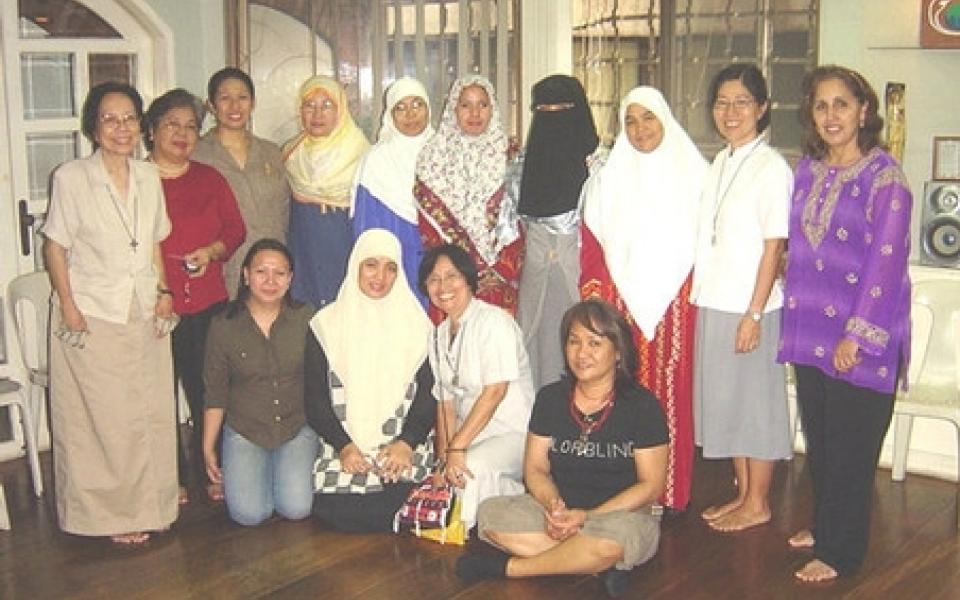
Interfaith women at the Peacemakers' Circle.
I have just attended the Asian Women Forum hosted by Religions for Peace Asia (in collaboration with the Royal and Pontifical University of Santo Thomas) were I was invited to be one of the speakers on the topic: Women as peacemakers: What do women have to offer?
One of the questions there that struck me was: What are we, women, not doing? In the face of the violence and wars that have been waged largely by men throughout history, why are the voices of women not being heard? And why are the various efforts of women at promoting peace and harmony in the different fields of endeavor not seeming to make a transformative impact on the world?
I have been engaged in the endeavor of promoting peace through interfaith dialogue and relationship-building since 1998. In this male-dominated field, I have managed to find my way and have gained a measure of respect from the men--religious leaders mostly--whom I have been working with.
This realization that I had made some progress came to me one day about five years ago during the anniversary celebration of the Imam Council of the Philippines, Inc. (ICPI) to which I, a Catholic woman, was invited. Over a hundred imams where gathered in the hall. As I entered, I was surprised to see that I was the only woman there. To my greater embarrassment, I was invited by the president of ICPI to join the distinguished guests (which included the highest ranking general of the Philippine National Police!) onstage and give a brief solidarity message before the august assembly of imams!
Aware of the Islamic tradition concerning women, I was acutely self-conscious of standing before them as a woman, and bare headed! I felt deeply humbled and rather bemused as though I was naked. In my consternation, I began to speak by apologizing for being a woman before them and for not wearing a veil, and asked for their kind understanding. When I heard no violent reaction from the hall, I took courage to thank them for their friendship and for supporting the Imams-Priests Dialogue program which my organization, The Peacemakers’ Circle Foundation, Inc. has been promoting under the Strengthening Grassroots Interfaith Dialogue and Understanding (SGIDU) program of the Australian Embassy in Manila. They nodded their heads in quiet approval, and I breathed a deep sigh of relief as I returned to my seat after my faltering speech.
The experience touched me to the core and the humbling feeling has remained with me throughout my journey.
As I reflect on the question: What are we, women, not doing? I think of the ways in which I have been striving as a woman to be a “bridge-builder” and a promoter of interfaith dialogue and relationship-building among men. What have I done to deserve being so well received by them?
In my reflections, I have noted ten ways of being a woman building bridges of mutual respect, understanding and cooperation between and among people of diverse cultures and beliefs. I share my decalogue below in the hope that this might be helpful to my sisters in peacebuilding so that together we can bring forth “woman power” in our collective endeavors.
Perhaps, if we take courage in being woman—together--we can help restore the balance of masculine and feminine energies in our world today, and take comfort in knowing that we are much needed here, and that truly we have the power to help make a beautiful difference in bringing about the change that we wish to see in our world!
A Woman’s Decalogue of Interfaith Dialogue
1. Check your heart. Ask yourself why you wish to engage in dialogue with those who do not share your faith. If it is because you wish to build mutually respectful and harmonious relationships with them and not to convert them to your faith, then your heart is in the right place.
2. Make room within. Reflect on your attitude about “the others.” Be aware of your biases and prejudices, fears and apprehensions about relating with them. Make an effort to understand and accept your fears and prejudices and try to overcome them by taking time to learn about those who do not share your faith but with whom you wish to engage in dialogue. Find something about their culture and beliefs that you like and/or admire.
3. Prepare a common ground. Begin by reflecting on hopes, dreams and aspirations that you both might have in common. You share a common humanity and underneath your unique identities, personalities, interests, and values, there are basic human needs that you have in common. You can prepare to meet each other there where you might find that you both wish to help each other address those needs, or work together to realize your shared hopes and dreams.
4. Respect diversity, honor differences. Be aware of the fact that diversity is part of the divine scheme of things. There are tall trees and short shrubs, birds that fly and snakes that slitter, mountains high and low lying meadows. Diversity is evident among people, too. There are tall people and those who are not so tall, there are those who are dark skinned and others who are fair skinned; and there are differences in age, gender, history, culture, race, and creed. Respect and honor those differences. They are what make our world beautiful, and our relationships enlivening and enriching.
5. Invite and be gracious. Get out of your comfort zone and reach out to “the others.” Graciously and humbly share with them your hopes, dreams and aspirations for a better community, a better world, and invite them to share with you their dreams too.
6. Create safe spaces and build trust. When they accept your invitation to come to the common ground and dialogue, make sure that this is in a neutral place where no symbols or articles of your faith might be perceived as imposing or threatening. And provide “safe spaces” for them where they can feel assured that you accept them for who they are, and trust that with you they can be themselves.
Strive to create a sense of being equal and together as human beings with no hierarchy of status or rank, or any furniture getting in the way between you and them. Try seating everyone in a circle with an open ‘sacred space” at the center with no "chairman of the board" presiding.
And as host and dialogue participant or facilitator, be modestly garbed, and be respectful of the ways of your dialogue partners—their customs and tradition—especially their ways of worship and prayer, of relating with women and with each other, their manner of greeting, the food that they eat or do not eat, etc. If possible, provide separate serving tables for the different dietary preferences (e.g. vegetarian, halal food, etc) during meals. Provide also a place for ablution and a prayer room especially for Muslims to go to during their prayer time.
7. Listen deeply. Make time to be fully present and hear “the other” speak. Be in the moment, and hold no fears from the past or anxieties about the future. Be in the “here-now moment.” Focus your attention away from yourself and fully on “the other” by silencing your mind and engaging in deep heart listening. Be sensitive to the being of “the other,” not only to the words that are being said, but most of all to the silences beneath those words. Utmost humility and loving patience is the attitude of heart here, and though they do not come naturally to some, humility and patience can be developed in time when the heart keeps listening deeply.
8. Speak mindfully. Respond without haste from the silence of your heart. The heart is a place beyond words where true love for “the other” as “neighbor” can arise, where compassion for our shared human condition can be experienced, and where deep respect and appreciation for the beauty and uniqueness of God’s creation in “the other” can be beheld with awe and reverence.
9. Appreciate uniqueness. There is beauty, divinity, and a sense of excitement and adventure in our human existence. Each relationship is unique just as each person in the relationship is unique. Building relationships with people who are different from our selves brings with it the challenge of inner growth and self-transformation. Learning to accept and appreciate our differences is a difficult process of “dying unto ourselves” so that “the other can be”. But to persevere in the endeavor strengthens organs of the soul that enable us to bear the gift of friendship and love for “the other” who may be different from our selves but with whom we share a common origin and destiny in God.
10. Inspire co-creative action. Interfaith dialogue is about relationship-building. Good and steadfast relationships are built on the foundations of trust. When we trust that we can be ourselves and not be expected to be like the other, when can be different yet mutually respectful and appreciative of each other’s uniqueness and differences, then our journey of friendship can inspire us to find places in the heart where we can be one and united in our efforts to find co-creative ways of bringing about a peaceful, harmonious and better world for ourselves, our children, and our children’s children.
